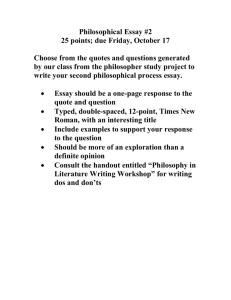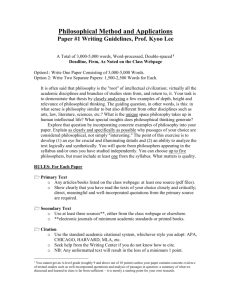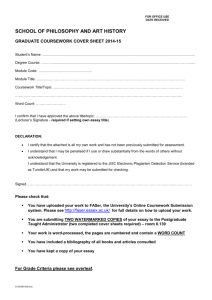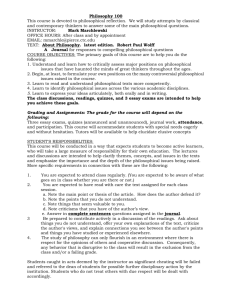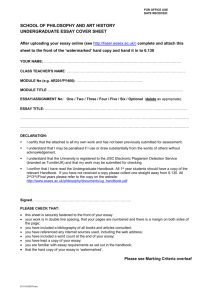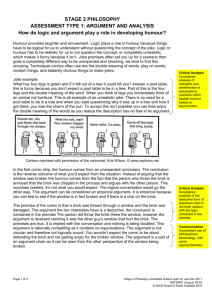Philosophy Note-Taking & Study Tips
advertisement
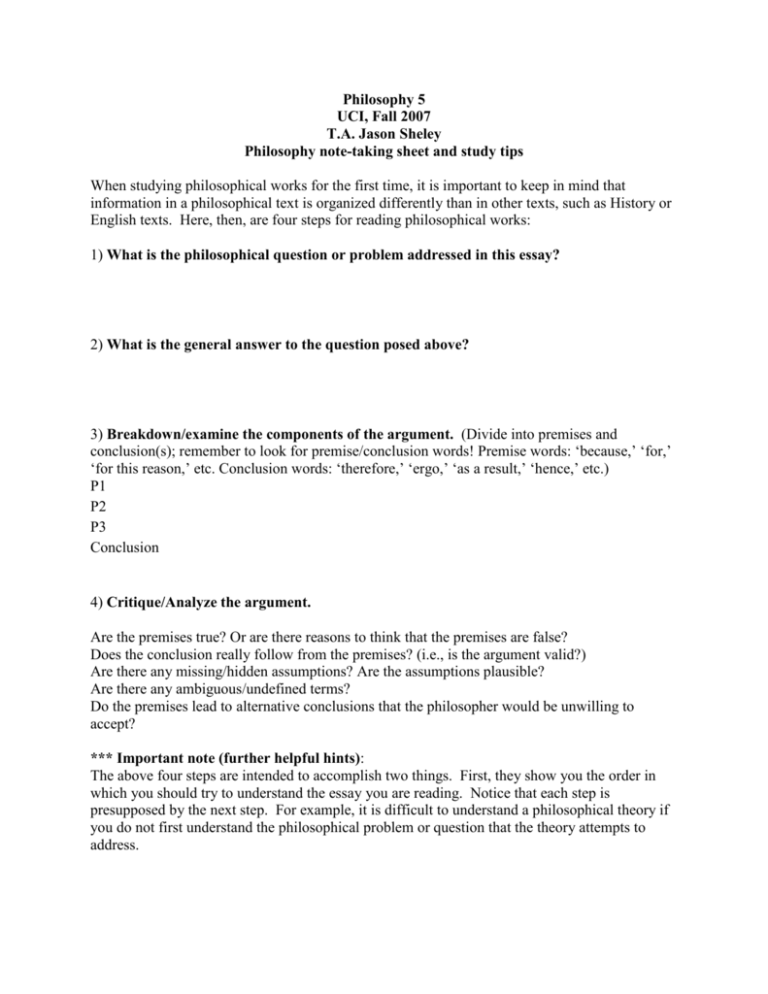
Philosophy 5 UCI, Fall 2007 T.A. Jason Sheley Philosophy note-taking sheet and study tips When studying philosophical works for the first time, it is important to keep in mind that information in a philosophical text is organized differently than in other texts, such as History or English texts. Here, then, are four steps for reading philosophical works: 1) What is the philosophical question or problem addressed in this essay? 2) What is the general answer to the question posed above? 3) Breakdown/examine the components of the argument. (Divide into premises and conclusion(s); remember to look for premise/conclusion words! Premise words: ‘because,’ ‘for,’ ‘for this reason,’ etc. Conclusion words: ‘therefore,’ ‘ergo,’ ‘as a result,’ ‘hence,’ etc.) P1 P2 P3 Conclusion 4) Critique/Analyze the argument. Are the premises true? Or are there reasons to think that the premises are false? Does the conclusion really follow from the premises? (i.e., is the argument valid?) Are there any missing/hidden assumptions? Are the assumptions plausible? Are there any ambiguous/undefined terms? Do the premises lead to alternative conclusions that the philosopher would be unwilling to accept? *** Important note (further helpful hints): The above four steps are intended to accomplish two things. First, they show you the order in which you should try to understand the essay you are reading. Notice that each step is presupposed by the next step. For example, it is difficult to understand a philosophical theory if you do not first understand the philosophical problem or question that the theory attempts to address. Second, the steps give you a way to measure how much studying you still need to do. For example, suppose you find that you understand the problem that is addressed in the essay, but do not yet understand the argument given for a particular claim. Then you need to spend more time working to understand the argument. And only once you understand the argument can you then begin to critique it. In many philosophy courses, your ultimate aim is to be able to critique the essay that you are reading. For now, however, we will focus on gaining mastery of the arguments presented by each philosopher. Another tip that can help you study philosophical texts more effectively is to understand the relationship between philosophy and mathematics. Since philosophical theories are built mainly out of abstract concepts (e.g., conceptual definitions) and logical relationships (e.g., arguments), we can study a philosophical theory in a way very similar to how we study newly learned concepts in mathematics (which are likewise built from abstract concepts and logical relationships). The key is to make sure that you repeatedly practice with the concept or the argument as much as you can, similar to how you used to practice repeatedly on your algebra problems. If you find that you get stuck on a particular topic, this method can help you get “unstuck.” First, identify the part of the essay that is giving you difficulty (e.g., figuring out what the argument is), and then rehearse and practice with that part until you understand it. (Note: when in doubt, ask the TA for help!) It turns out that this advice is not new. Consider what two ancient philosophers had to say about the matter of how best to study philosophy: “You should try, moreover, to master the heads under which other arguments mostly tend to fall. For just as in geometry it is useful to be practiced in the elements, and in arithmetic having the multiplication table up to ten at one’s fingers’ ends makes a great difference to one’s knowledge of the multiples of other numbers too, likewise also in arguments it is a great advantage to be well up in regard to first principles, and to have a thorough knowledge of propositions by heart.” Aristotle, Topics 163b22-27 “We must, then, approach these general points continually, and get into our memory an amount of doctrine sufficient to permit the most vital application of the intellect to the facts; moreover, complete precision on detailed points will be discovered if the general outlines are comprehensively grasped and remembered…. For it is not possible to know the concentrated result of our continuous overview of the universe unless one can have in oneself a comprehensive grasp by means of brief maxims of all that might also be worked out in detail with precision.” Epicurus, Letter to Herodotus (Diogenes Laertius 10. 34-83) Finally, these methods can help you write about philosophical problems more effectively in a couple ways. First, the methods can help you write better because you will find that repeatedly practicing with a concept or argument will allow you to express it more clearly. Second, the methods can help you organize your essay because it is often a good idea to organize your paper around a philosophical problem in roughly the order I have suggested.
